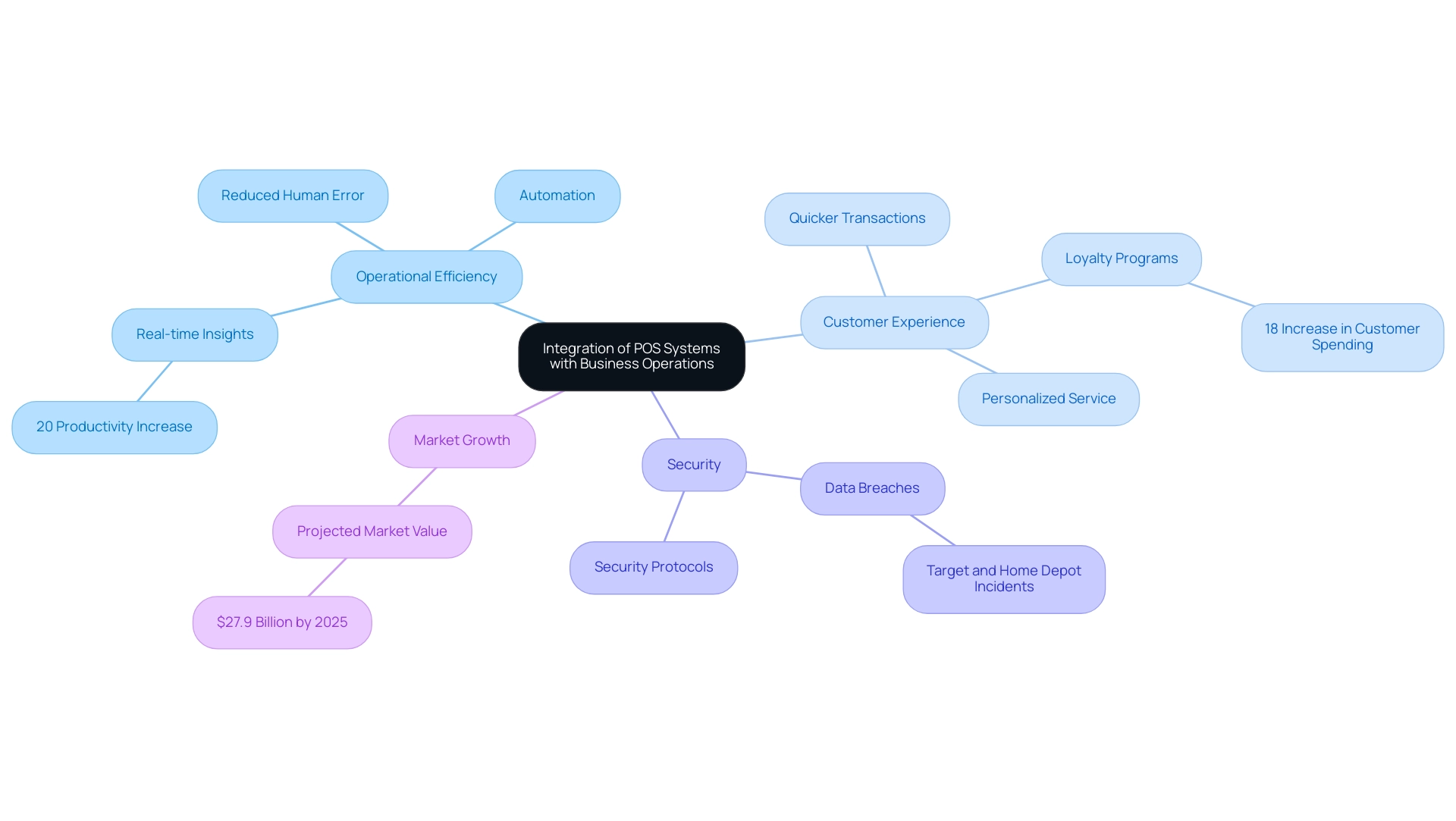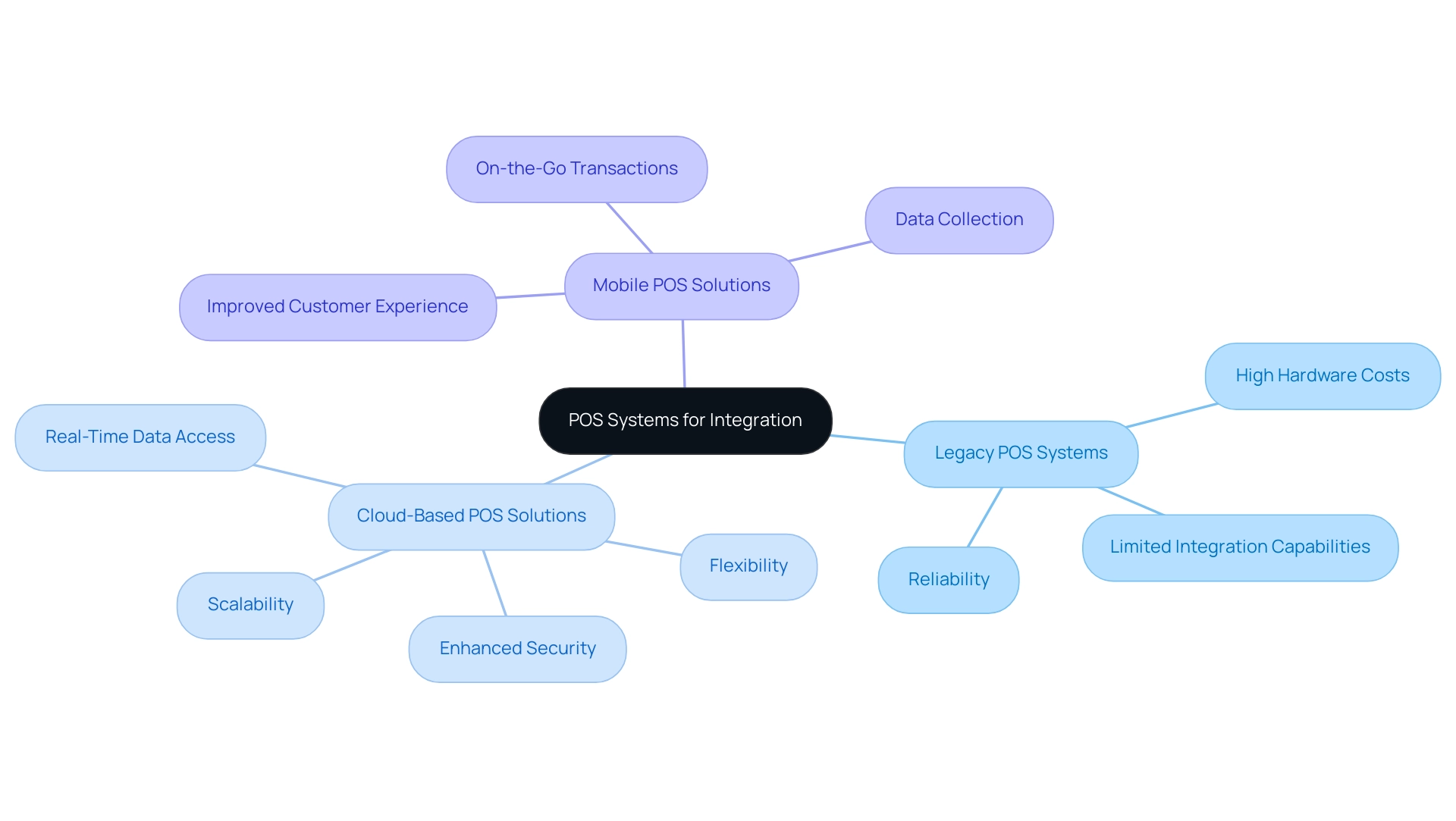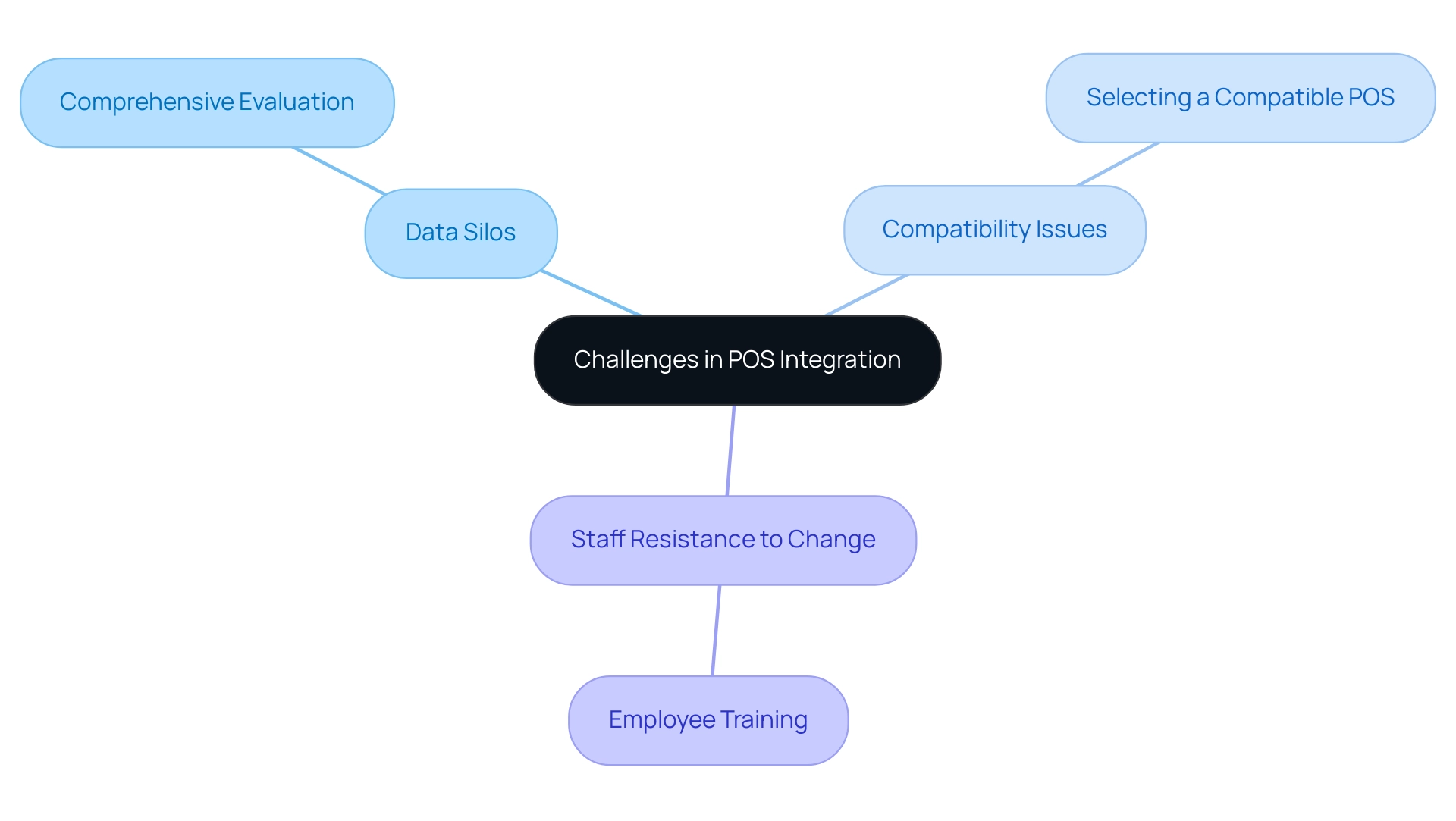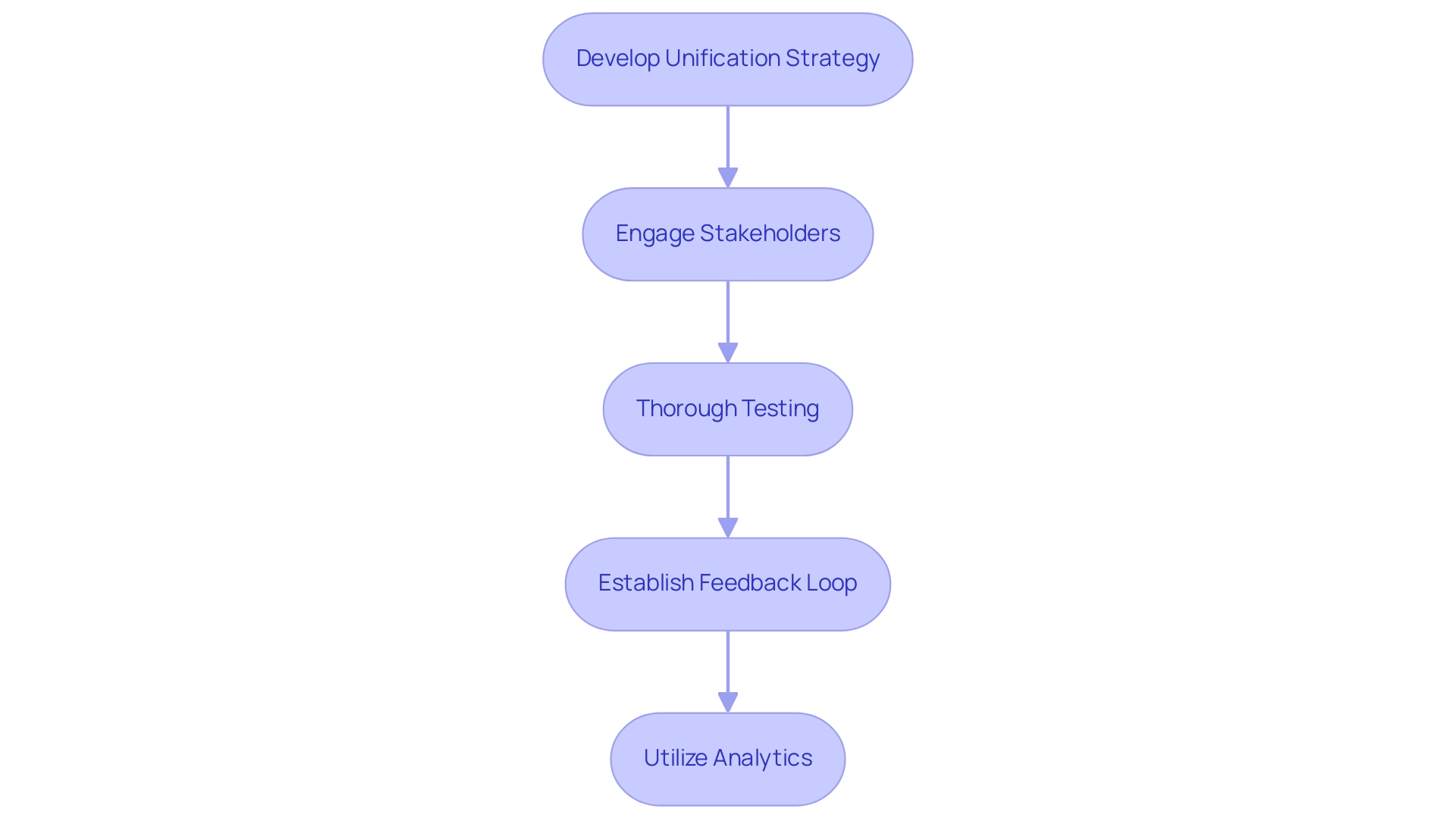Overview
This article delves into best practices for point of sale (POS) integrations, underscoring strategies that significantly enhance operational efficiency, customer satisfaction, and security.
Why is it crucial to develop a clear unification strategy?
- Engaging stakeholders
- Ensuring ongoing support
These are pivotal elements that lead to substantial improvements in productivity and customer loyalty. As demonstrated by successful case studies and industry statistics, these integrations are not just beneficial; they are essential.
By adopting these best practices, businesses can transform their operations and foster lasting customer relationships. Take action now to explore how your organization can benefit from effective POS integration.
Introduction
In an increasingly competitive business landscape, the integration of Point of Sale (POS) systems with various operational applications has emerged as a critical strategy for enhancing efficiency and driving growth.
How can organizations streamline their operations and reduce the risk of manual errors? By linking POS systems with:
- Inventory management
- Accounting software
- Customer relationship management tools
Companies can address these pressing challenges. As businesses grapple with evolving technology and heightened customer expectations, the significance of seamless POS integration cannot be overstated.
This article delves into the multifaceted benefits of POS integration, explores the various types of systems available, and outlines best practices for implementation. Ultimately, it showcases how companies can leverage these integrations to future-proof their operations and maintain a competitive edge.
Understanding Point of Sale (POS) Integration
The process of point of sale integrations involves linking a POS platform with various enterprise applications, including inventory management, accounting software, and customer relationship management (CRM) tools. This combination enables a smooth transfer of information between platforms, which is essential for optimizing processes, reducing manual data input, and enhancing overall effectiveness. Avato’s dedicated hybrid unification platform plays a crucial role in this process, enabling companies to simplify diverse frameworks and enhance their operational capabilities by effectively addressing the specific challenges encountered in POS unification.
The impact of effective point of sale integrations on organizational operations is profound. For instance, businesses that have successfully integrated their POS technology report significant improvements in operational efficiency. A significant instance is the aftermath of high-profile data breaches at retailers such as Target and Home Depot, which highlighted the necessity for robust security measures in POS frameworks. How can businesses ensure they are not only protecting their data but also fostering consumer trust?
These incidents not only impacted millions of consumers but also underscored the necessity of integrating security protocols within POS solutions to uphold customer trust and safeguard sensitive information. As David Rivera, a Retail Staff Writer, observes, “The combination of POS technology with security measures is not just a technical necessity; it’s a fundamental aspect of maintaining consumer trust in today’s digital landscape.”
Recent trends indicate a growing reliance on cloud-based POS solutions, with over 60% of recent POS sales being cloud platforms. This shift is driven by the need for flexibility and scalability in operational activities. As of December 2023, Apple Pay emerged as the leading mobile payment brand in the U.S., utilized by 60% of consumers in restaurants and retail, followed closely by CashApp and PayPal. How does this shift in payment methods reflect the evolving landscape of consumer preferences?
This trend highlights the significance of combining POS technology with mobile payment solutions to improve customer experience and operational efficiency. Experts agree that point of sale integrations with other applications are essential for contemporary enterprises. The global POS hardware market is projected to grow from $100 billion in 2024 to nearly $152 billion by 2029, reflecting the increasing investment in integrated solutions. Industry leaders emphasize that effective point of sale integrations not only streamline operations but also provide valuable insights into customer behavior and inventory management, ultimately driving profitability.
Avato’s hybrid unification platform is designed to support these connections, ensuring that businesses can adapt to evolving market demands and maintain a competitive edge in their respective industries. By unlocking isolated assets, Avato shows its dedication to delivering results for customers, further enhancing the value of its solutions.
In summary, the benefits of point of sale integrations are clear: they enhance operational efficiency, reduce errors, and improve customer satisfaction. By utilizing integrated point-of-sale solutions through Avato’s offerings, companies can secure their operations for the future and prosper in a progressively interconnected digital environment.
The Importance of Integrating POS Systems with Business Operations
Incorporating point of sale integrations with operational activities is crucial for various compelling reasons. Primarily, it significantly enhances operational efficiency by automating data transfers between platforms, minimizing the risk of human error. This automation is vital, particularly in sectors like retail and hospitality, where precision in sales and inventory management directly impacts profitability.
Furthermore, point of sale integrations provide real-time insights into sales and inventory levels, enabling enterprises to make informed decisions swiftly. Companies that have embraced point of sale integrations report enhancements in operational efficiency, with certain studies suggesting these integrations can yield a 20% boost in productivity. This capability is especially critical in today’s fast-paced market, where timely data can distinguish success from failure.
Additionally, the incorporation of POS networks enhances customer experiences by facilitating quicker transactions and enabling personalized service. Customers appreciate the efficiency of rapid checkouts and tailored recommendations based on their purchasing history, which can foster increased loyalty and spending. Organizations with integrated loyalty programs have observed customer spending rise by up to 18%, illustrating the direct link between integration and customer satisfaction.
Approximately 50% of small businesses utilizing POS technology have integrated loyalty programs, further underscoring the importance of this integration.
The significance of point of sale integrations is further highlighted by recent case studies that reveal vulnerabilities in retail environments. High-profile data breaches in POS technologies, such as those experienced by Target and Home Depot, underscore the critical need for robust security measures. These incidents not only compromised sensitive customer data but also emphasized the necessity of integrating security protocols within point of sale systems to safeguard against future threats.
Avato’s hybrid unification platform addresses these vulnerabilities by offering extensive security features and immediate monitoring capabilities, ensuring that enterprises can protect their operations effectively.
In conclusion, unifying organizational operations with point of sale integrations is not merely a technical upgrade; it is a strategic necessity that drives growth, enhances operational efficiency, and improves customer experiences. As the market for unification solutions continues to expand, projected to reach $27.9 billion by 2025, enterprises must prioritize this unification to maintain a competitive edge and ensure lasting success. Avato’s hybrid connection platform exemplifies this approach, enabling organizations to simplify complex linkages and unlock business value.
Gustavo Estrada, a client, commended Avato for its ability to align the results they aimed to achieve within the desired time frames and budget limits, highlighting the importance of selecting the right partner.

Exploring Different Types of POS Systems for Integration
Companies today have access to a diverse array of point of sale integrations, each meticulously designed to fulfill specific operational requirements and connectivity objectives. While legacy POS solutions are reliable, they often demand substantial hardware investments and may falter in integration capabilities, thereby limiting their adaptability in a rapidly evolving digital landscape. Conversely, cloud-based point of sale integrations present significant advantages, including flexibility and scalability, enabling companies to access their data from virtually any location.
This adaptability is paramount, particularly as more than 56% of US merchants have embraced POS analytics to bolster security and combat fraud. Mobile POS solutions further broaden the horizons by facilitating transactions on-the-go, proving especially advantageous for businesses with a mobile workforce. These frameworks not only streamline operations but also elevate customer experiences by enabling quicker service and enhanced data collection.
The market is increasingly gravitating towards cloud-based solutions with point of sale integrations, which are capturing a larger share compared to traditional platforms. This shift is evident across multiple industries, such as retail and hospitality, where companies are opting for cloud-based solutions that incorporate point of sale integrations to enhance connectivity and operational effectiveness. For instance, a case study on restaurants revealed that 68% of restaurant professionals routinely review sales reports to monitor performance, underscoring the significance of real-time data access in decision-making processes.
Avato’s hybrid connectivity platform plays a pivotal role in this landscape by streamlining the connection of diverse frameworks, thereby enhancing organizational value. Gustavo Estrada, a client, remarked, ‘Avato has simplified complex projects and delivered results within desired time frames and budget constraints,’ highlighting the efficacy of integrated solutions in optimizing operations.
Understanding the unique characteristics and functionalities of point of sale integrations is essential for organizations aiming to refine their incorporation strategies. By evaluating the advantages of legacy systems in comparison to cloud-based and mobile POS solutions, organizations can make informed choices that align with their operational needs and enhance their overall data management capabilities, ultimately fortifying their operations through seamless connectivity.

Key Features to Look for in a POS System for Successful Integration
When selecting a POS solution, companies must emphasize several essential characteristics for effective point of sale integrations that significantly impact operational efficiency and customer satisfaction. First and foremost, robust API capabilities are crucial for facilitating seamless data exchange between point of sale integrations and other platforms, enabling real-time updates and comprehensive data management. According to industry insights, organizations that leverage advanced API functionalities alongside point of sale integrations experience a marked improvement in integration speed and accuracy, which is vital in today’s fast-paced market.
In fact, 91% of restaurant proprietors expected profit growth in 2019, highlighting the financial advantages of investing in advanced point of sale integrations.
User-friendly interfaces represent another essential feature, as they enhance employee adoption and minimize training time. A system that is intuitive and easy to navigate can lead to quicker onboarding and increased productivity. Furthermore, real-time reporting and analytics capabilities empower organizations to monitor performance metrics and make informed, data-driven decisions that drive profitability.
Continuous monitoring and optimization, as emphasized in Avato’s Hybrid Integration Platform, ensure that organizations can leverage analytics to improve operations and enhance customer experiences. As noted by Gustavo Estrada, a client, ‘Avato can streamline intricate projects and produce outcomes within preferred timelines and budget limitations,’ underscoring the importance of selecting a POS solution that effectively meets organizational requirements.
Security features cannot be overlooked; encryption and adherence to industry compliance standards are critical for safeguarding sensitive customer information during transactions. As companies increasingly face cyber threats, investing in a POS system with robust security measures and point of sale integrations is not just a best practice but a necessity. Avato’s commitment to regulatory compliance and security audits further strengthens its position as a reliable partner in integration solutions.
Incorporating these features not only streamlines operations but also positions companies to respond effectively to evolving market demands. For instance, the case study titled “Key POS Features for 2025″ discusses how retailers that have upgraded to modern point of sale integrations, which include integrated payment processing and advanced reporting capabilities, have reported enhanced checkout efficiency and improved overall business performance. By focusing on these essential components, organizations can ensure that their point of sale integrations contribute positively to their unification strategies and overall success.
Avato distinguishes itself from rivals by providing a blend of speed, security, and ease in merging, which aids in lowering expenses and improving operational capabilities. Additionally, Avato’s Hybrid Integration Platform offers essential B2B connectivity tools that facilitate effective data management, aligning with the guide to successful digital transformation.
Common Challenges in POS Integration and How to Overcome Them
Common challenges in POS connectivity often stem from data silos, compatibility issues, and staff resistance to change. An important statistic underscores that 69% of restaurant owners prioritize connections with other platforms when assessing new POS software, highlighting the essential requirement for seamless connectivity. To effectively address these challenges, companies should begin with a comprehensive evaluation of their current frameworks to identify potential connection points.
Involving employees early in the merging process and providing thorough training can significantly reduce resistance and foster a culture of adaptability.
Furthermore, selecting a POS solution with proven connectivity features is crucial for mitigating compatibility problems. Successful point of sale integrations, such as those between POS and ERP platforms, demonstrate that automating data transfer not only enhances efficiency but also minimizes manual errors and leads to substantial cost savings. For instance, companies that have meticulously evaluated their POS options—considering factors like transaction limits and training requirements—have reported smoother transitions and improved operational performance.
This aligns with insights from the case study titled ‘Choosing the Right POS Solution,’ which emphasizes the significance of selecting an appropriate POS solution based on specific organizational needs while avoiding potential drawbacks like hidden expenses and inadequate training.
Expert opinions highlight the necessity of confronting compatibility issues directly. By leveraging a hybrid connection platform like Avato, organizations can access the full capabilities of their legacy frameworks while ensuring that new technologies operate seamlessly together. Avato’s proven track record in the financial sector, as evidenced by its collaboration with Coast Capital, illustrates its capacity to facilitate smooth transitions with minimal downtime.
This proactive strategy not only mitigates the risks associated with data silos but also empowers organizations to thrive in an increasingly interconnected marketplace, underscoring the importance of effective POS-ERP collaborations. Moreover, ensuring that systems are future-ready is vital; Avato’s expertise in hybrid connections transforms financial institutions by reducing costs, accelerating product delivery, and enhancing customer satisfaction. By mobilizing stakeholders and modeling new operational processes, organizations can ensure that their unification strategies are robust and adaptable to future challenges.

Best Practices for Implementing POS Integrations
To achieve successful point of sale integrations, businesses must adhere to several best practices that ensure a seamless transition and optimal performance. First and foremost, developing a clear unification strategy is essential. This strategy should delineate objectives, timelines, and resource allocation, acting as a roadmap that directs the unification process and aligns all efforts towards shared goals.
Engaging key stakeholders from various departments is crucial for promoting alignment and garnering support throughout the unification journey. This engagement enhances collaboration and ensures diverse viewpoints are considered, leading to a more robust unification strategy. Research indicates that projects with active stakeholder involvement are significantly more likely to meet their objectives and stay within budget.
Thorough testing prior to going live is another critical step. This phase allows companies to identify and rectify potential issues, minimizing disruptions during the actual implementation. A proactive testing approach can prevent costly setbacks and ensure that the system operates as intended from day one.
Post-implementation, establishing a feedback loop is vital for continuous improvement. By continuously monitoring performance and soliciting feedback from users, organizations can make necessary adjustments to optimize the integration over time. This iterative process not only enhances system performance but also aids in adapting to changing organizational needs.
Avato’s robust analytics capabilities play a key role in this continuous monitoring, enabling organizations to enhance customer experiences and identify new opportunities for innovation. To implement these analytics capabilities effectively, businesses should consider setting up regular performance reviews, utilizing dashboards for real-time insights, and establishing key performance indicators (KPIs) to measure success.
Real-world examples underscore the effectiveness of these practices. For instance, Gustavo Estrada from BC Provincial Health Services Authority emphasized Avato’s capability to simplify intricate projects and produce outcomes within specified time frames and budget limitations, demonstrating the impact of a well-executed unification strategy.
Moreover, prominent data breaches in retail, such as those faced by Target and Home Depot, have heightened the necessity for strong security measures in point-of-sale setups. This further highlights the significance of a thorough unification method that prioritizes safety and dependability. With 91% of restaurant owners expecting profit increases in 2019, effective POS connections can significantly contribute to financial success. Additionally, as the POS hardware market is projected to reach $66.30 billion by 2025, the increasing significance and investment in POS solutions cannot be overlooked.
By adhering to these best practices, businesses can effectively navigate the complexities of point of sale integrations, ensuring their setups are not only efficient but also secure and adaptable to future needs. Avato’s dependable, future-ready technology framework plays a vital role in assisting organizations to adjust to these evolving requirements, expediting secure network alignment for banking, healthcare, and government sectors.

Ensuring Ongoing Support and Maintenance for Integrated POS Systems
Ensuring ongoing support and maintenance for point of sale integrations is crucial for achieving long-term success, particularly in a rapidly expanding market projected to reach $27.9 billion by 2025. Avato’s professional unification services provide the skilled assistance necessary to swiftly address technical issues and deliver regular updates, ensuring seamless data and network cohesion. Establishing a dedicated support team is essential for proactively identifying potential problems before they escalate, thereby minimizing downtime and enhancing operational efficiency.
Furthermore, training personnel on updates and changes is vital, empowering them to effectively utilize the integrated platform and adapt to new functionalities.
Avato’s hybrid integration platform stands out with its unique characteristics that streamline the integration of diverse environments, enabling companies to access isolated resources and generate substantial value. Statistics indicate that companies prioritizing ongoing support experience a significant enhancement in reliability, with regular maintenance contributing to a 30% decrease in unexpected failures. This underscores the importance of a structured approach to maintenance, which not only safeguards the integrity of the POS platforms but also enhances customer engagement and transaction precision.
With the POS hardware market expected to reach $66.30 billion by 2025, the demand for reliable support and maintenance is more critical than ever.
Numerous enterprises have effectively established support teams focused on ensuring the dependability of their POS solutions. These teams play a pivotal role in maintaining operational continuity and adapting to evolving market demands. As noted by customer Gustavo Estrada, “Avatar has simplified complex projects and delivered results within desired time frames and budget constraints,” emphasizing the effectiveness of dedicated support teams in achieving operational success.
Expert opinions consistently highlight that ongoing support is not merely an operational necessity but a strategic advantage that can differentiate businesses in a competitive landscape. By investing in robust support and maintenance strategies, organizations can secure the performance and longevity of their point of sale integrations, ultimately driving greater success in their operations. Additionally, with nearly half of restaurateurs (46%) desiring to upgrade their POS technology to enhance omnichannel customer experiences, the role of ongoing support becomes even more significant in meeting evolving customer expectations.
For companies contemplating unification, Avato offers clear pricing structures and schedules customized to specific project requirements, ensuring transparency and assurance in the unification process. Potential clients can also request demos to experience firsthand how Avato’s solutions can transform their operations.
Case Studies: Successful POS Integrations in Action
Avato originated with a team of enterprise architects who recognized the need for a more effective approach to integrating diverse networks and data. This commitment to simplifying complex challenges is evident in numerous companies that have successfully leveraged point of sale integrations, underscoring the effectiveness of established best practices. For instance, a leading retail chain implemented a cloud-based POS solution that seamlessly integrated with its inventory management software.
This integration enabled real-time inventory monitoring, significantly reducing stockouts and enhancing customer satisfaction. In another example, a restaurant adopted point of sale integrations with a reservation platform, streamlining operations and enriching the overall dining experience for its patrons.
These case studies not only highlight the tangible benefits of effective point of sale integrations but also serve as a roadmap for enterprises seeking to replicate such success. The incorporation of these integrations has been associated with improved operational efficiency and enhanced customer interactions. Data indicates that retailers adopting connected solutions can experience up to a 38% increase in average transaction values, as illustrated in the case study titled ‘Omnichannel Integration: 38% Higher Average Transaction Value.’ This underscores the crucial role that efficient point of sale integrations play in driving company growth and fostering customer loyalty.
As Gustavo Estrada, Acting Provincial Director at BC Provincial Health Services Authority, remarked, “Avato enabled us to align the outcomes we wanted to achieve in the time frame and price point we were targeting.” Avato simplifies complex projects, delivering results within specified time frames and budget constraints. By utilizing Avato’s dedicated hybrid integration platform, organizations can future-proof their operations through seamless data and platform integration, transforming legacy frameworks into cost-effective solutions while enhancing operational visibility and problem-solving capabilities.
At the heart of Avato’s mission lies a commitment to dedication and problem-solving, empowering businesses to navigate the complexities of integrating disparate systems.
Conclusion
Integrating Point of Sale (POS) systems with various operational applications is not merely a trend; it is a strategic necessity for businesses seeking to enhance efficiency and drive growth. This article underscores the multifaceted benefits of POS integration, which include:
- Improved operational efficiency
- Reduced manual errors
- Enhanced customer satisfaction
By automating data transfers and providing real-time insights, integrated POS systems empower organizations to make informed decisions swiftly, ultimately leading to increased productivity and profitability.
Furthermore, the importance of selecting the right POS system cannot be overstated. Businesses must consider key features such as:
- Robust API capabilities
- User-friendly interfaces
- Strong security measures
to ensure successful integration. The rise of cloud-based and mobile POS systems illustrates a shift towards more flexible and scalable solutions, enabling companies to adapt to evolving market demands and enhance customer experiences.
As organizations encounter common challenges in POS integration, such as data silos and compatibility issues, adopting best practices can facilitate smoother transitions and optimize performance. Continuous support and maintenance are equally crucial to ensure long-term success and operational continuity. By investing in robust integration strategies and leveraging platforms like Avato, businesses can unlock significant value, safeguard sensitive information, and ultimately thrive in a competitive landscape.
In conclusion, the integration of POS systems is a vital component of modern business operations. Companies that prioritize seamless integration not only streamline their processes but also position themselves to meet the evolving expectations of their customers. As the market for integrated solutions continues to grow, embracing this approach will be key to sustaining a competitive edge and achieving long-term success.

